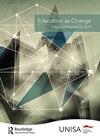Marx’s Ghost in the Shell: Troubling Techno-Solutionism in Post-Secondary Education and Training Policy Imaginaries
IF 1
4区 教育学
Q3 EDUCATION & EDUCATIONAL RESEARCH
引用次数: 1
Abstract
Post-secondary South African education policy is pinning its hopes of increased access to education on technological changes, especially in light of increased demand for education while persisting with fiscal austerity. This article examines one policy text—the Open Learning Policy Framework—that exemplifies this techno-solutionist policy logic in the post-secondary education and training sector. Structured around the triad of “context-text-consequences”, the article conducts a critical discourse analysis of the Open Learning Policy Framework, positing that techno-solutionism performs an under-labouring role for other more commonly critiqued logics such as new managerialism, social justice as equality and/or equity, and human capital theory. It further troubles the Open Learning Policy Framework’s definition of “open learning”, examining it as a truth/power regimen that constructs the object it espouses to describe. Finally the article considers some of the consequences of such a pivot in education, including the invisible transformation of relations in pedagogic labour, and the subjectivity of students engaged in “open learning” as individualistic neoliberal “lifelong (l)earners”. The article attempts to “raise awareness” of such relations and their constraints on imagination, with the aim of provoking alternative imaginings about how technology and education might produce humanising and emancipatory education.马克思的壳中幽灵:中学后教育和培训政策想象中的技术解决主义
南非的高等教育政策将增加受教育机会的希望寄托在技术变革上,特别是考虑到对教育的需求增加,同时又坚持财政紧缩。本文考察了一个政策文本——开放学习政策框架——它在中学后教育和培训部门体现了这种技术解决方案主义的政策逻辑。本文围绕“语境-文本-后果”三元结构,对开放学习政策框架进行了批判性话语分析,假设技术解决方案主义对其他更常见的批评逻辑(如新管理主义、作为平等和/或公平的社会正义以及人力资本理论)发挥了不足的作用。它进一步质疑了开放学习政策框架对“开放学习”的定义,将其视为构建其支持描述的对象的真理/权力方案。最后,本文考虑了这种教育支点的一些后果,包括教师劳动关系的无形转变,以及作为个人主义新自由主义“终身收入者”参与“开放学习”的学生的主体性。本文试图“提高人们对这种关系及其对想象力的限制的认识”,目的是激发人们对技术和教育如何产生人性化和解放性教育的另类想象。
本文章由计算机程序翻译,如有差异,请以英文原文为准。
求助全文
约1分钟内获得全文
求助全文
来源期刊

Education As Change
EDUCATION & EDUCATIONAL RESEARCH-
CiteScore
1.40
自引率
0.00%
发文量
29
审稿时长
24 weeks
期刊介绍:
Education as Change is an accredited, peer reviewed scholarly online journal that publishes original articles reflecting critically on issues of equality in education and on the ways in which educational practices contribute to transformation in non-formal, formal and informal contexts. Critique, mainly understood in the tradition of critical pedagogies, is a constructive process which contributes towards a better world. Contributions from and about marginalised communities and from different knowledge traditions are encouraged. The articles could draw on any rigorous research methodology, as well as transdisciplinary approaches. Research of a very specialised or technical nature should be framed within relevant discourses. While specialised kinds of research are encouraged, authors are expected to write for a broader audience of educational researchers and practitioners without losing conceptual and theoretical depth and rigour. All sectors of education are covered in the journal. These include primary, secondary and tertiary education, adult education, worker education, educational policy and teacher education.
 求助内容:
求助内容: 应助结果提醒方式:
应助结果提醒方式:


